Mental Health Report: Symptoms, Risks, Recovery, and Care Perspectives
VerifiedAdded on 2022/09/15
|17
|5081
|21
Report
AI Summary
This comprehensive report delves into the complexities of mental health, focusing on the symptoms and risk factors associated with psychosis, depression, and mania. It provides a detailed analysis of these conditions, including their impact on individuals and society. The report further explores the principles of recovery-oriented mental health care, emphasizing the importance of personalized approaches and patient empowerment. It examines the roles of primary, secondary, and tertiary mental health care providers, outlining the types of care consumers can expect from each level of service. Additionally, the report addresses the legal implications associated with mental health care, ensuring a thorough understanding of the subject matter. The report emphasizes the importance of the recovery-oriented mental health approach to ensure the overall mental health outcomes of the consumers. The assignment is designed to support the overall recovery of the mental health related outcomes of the consumers. The first principle of the recovery-oriented mental health approach includes uniqueness of the individual.
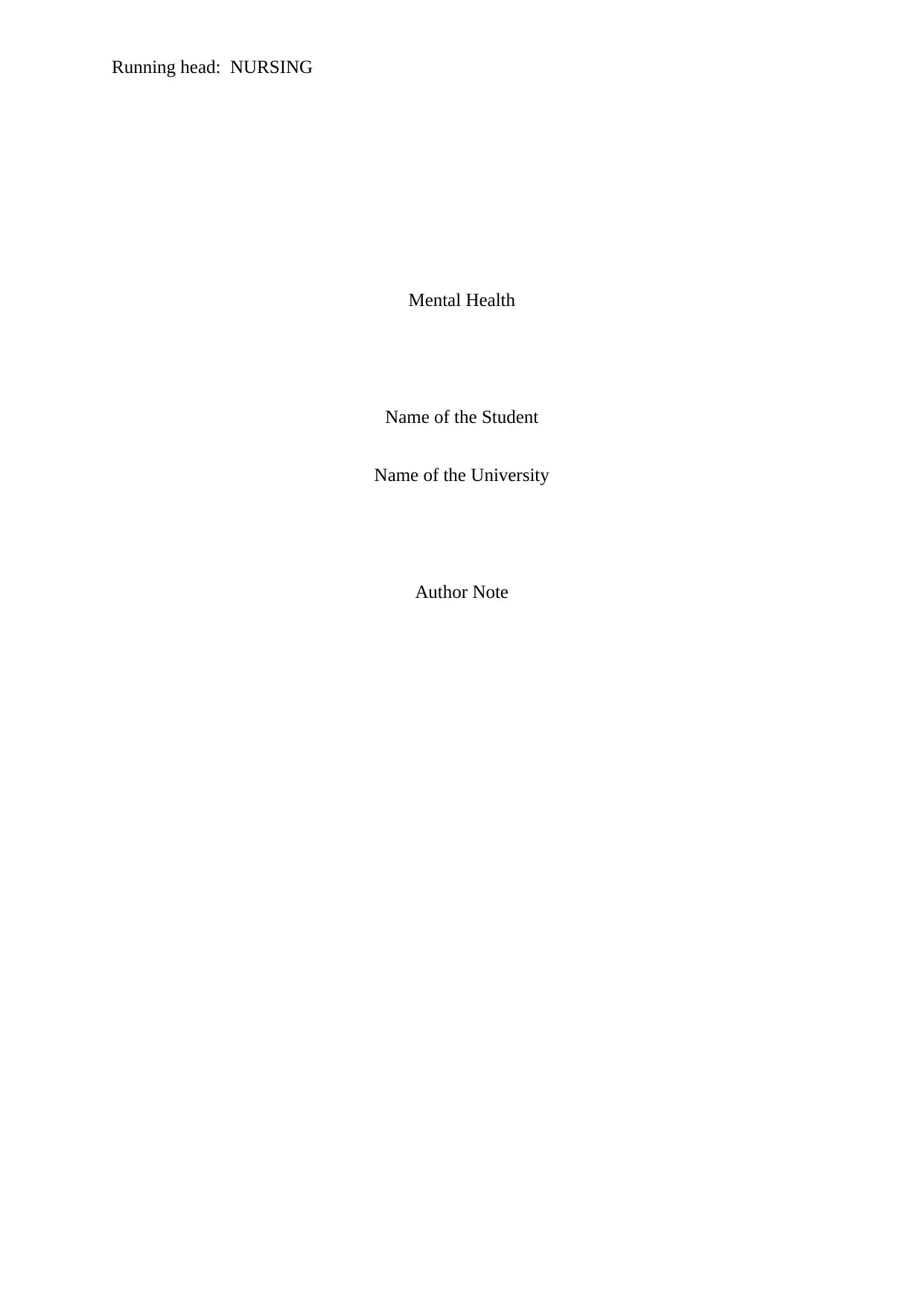
Running head: NURSING
Mental Health
Name of the Student
Name of the University
Author Note
Mental Health
Name of the Student
Name of the University
Author Note
Paraphrase This Document
Need a fresh take? Get an instant paraphrase of this document with our AI Paraphraser
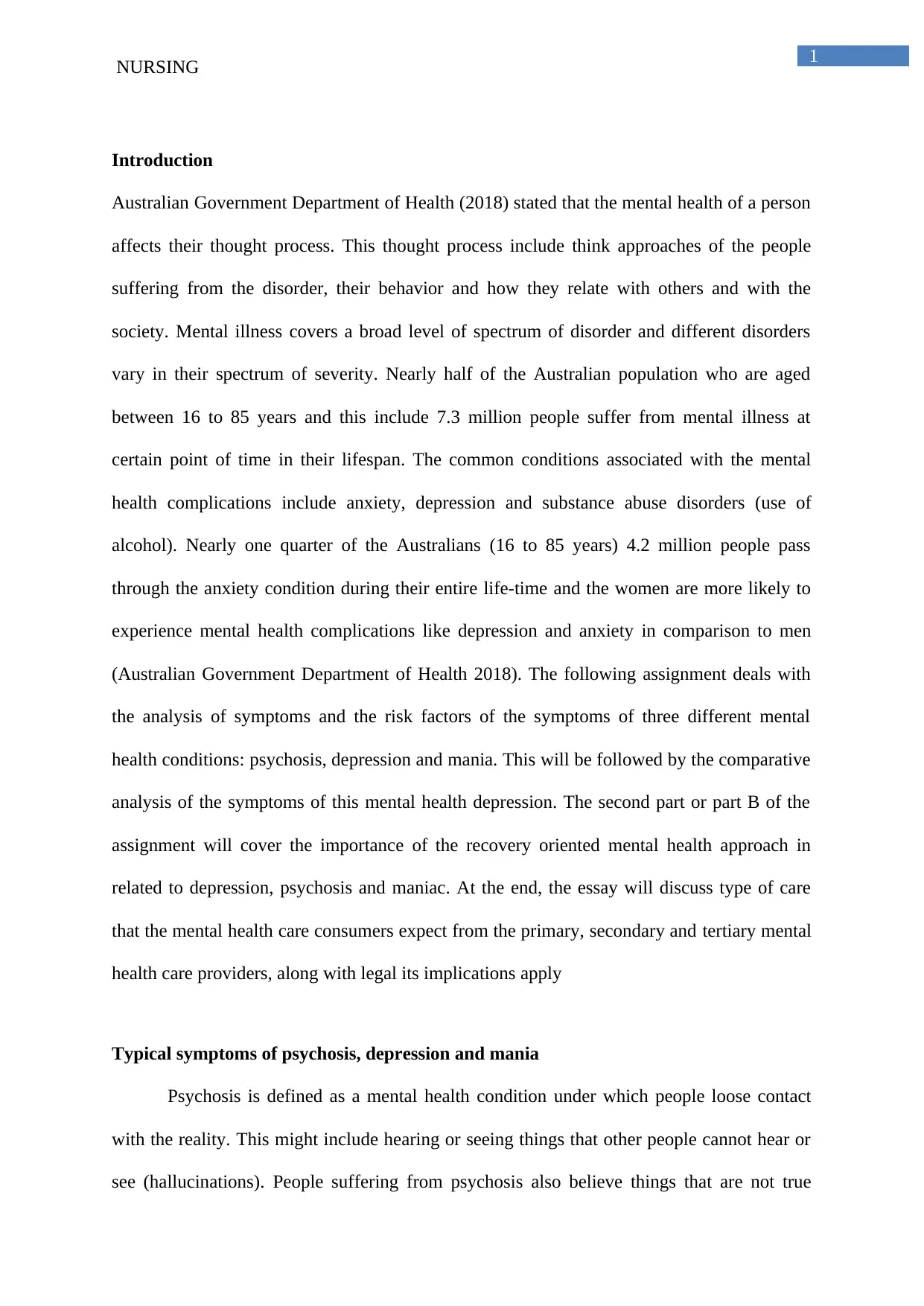
1
NURSING
Introduction
Australian Government Department of Health (2018) stated that the mental health of a person
affects their thought process. This thought process include think approaches of the people
suffering from the disorder, their behavior and how they relate with others and with the
society. Mental illness covers a broad level of spectrum of disorder and different disorders
vary in their spectrum of severity. Nearly half of the Australian population who are aged
between 16 to 85 years and this include 7.3 million people suffer from mental illness at
certain point of time in their lifespan. The common conditions associated with the mental
health complications include anxiety, depression and substance abuse disorders (use of
alcohol). Nearly one quarter of the Australians (16 to 85 years) 4.2 million people pass
through the anxiety condition during their entire life-time and the women are more likely to
experience mental health complications like depression and anxiety in comparison to men
(Australian Government Department of Health 2018). The following assignment deals with
the analysis of symptoms and the risk factors of the symptoms of three different mental
health conditions: psychosis, depression and mania. This will be followed by the comparative
analysis of the symptoms of this mental health depression. The second part or part B of the
assignment will cover the importance of the recovery oriented mental health approach in
related to depression, psychosis and maniac. At the end, the essay will discuss type of care
that the mental health care consumers expect from the primary, secondary and tertiary mental
health care providers, along with legal its implications apply
Typical symptoms of psychosis, depression and mania
Psychosis is defined as a mental health condition under which people loose contact
with the reality. This might include hearing or seeing things that other people cannot hear or
see (hallucinations). People suffering from psychosis also believe things that are not true
NURSING
Introduction
Australian Government Department of Health (2018) stated that the mental health of a person
affects their thought process. This thought process include think approaches of the people
suffering from the disorder, their behavior and how they relate with others and with the
society. Mental illness covers a broad level of spectrum of disorder and different disorders
vary in their spectrum of severity. Nearly half of the Australian population who are aged
between 16 to 85 years and this include 7.3 million people suffer from mental illness at
certain point of time in their lifespan. The common conditions associated with the mental
health complications include anxiety, depression and substance abuse disorders (use of
alcohol). Nearly one quarter of the Australians (16 to 85 years) 4.2 million people pass
through the anxiety condition during their entire life-time and the women are more likely to
experience mental health complications like depression and anxiety in comparison to men
(Australian Government Department of Health 2018). The following assignment deals with
the analysis of symptoms and the risk factors of the symptoms of three different mental
health conditions: psychosis, depression and mania. This will be followed by the comparative
analysis of the symptoms of this mental health depression. The second part or part B of the
assignment will cover the importance of the recovery oriented mental health approach in
related to depression, psychosis and maniac. At the end, the essay will discuss type of care
that the mental health care consumers expect from the primary, secondary and tertiary mental
health care providers, along with legal its implications apply
Typical symptoms of psychosis, depression and mania
Psychosis is defined as a mental health condition under which people loose contact
with the reality. This might include hearing or seeing things that other people cannot hear or
see (hallucinations). People suffering from psychosis also believe things that are not true
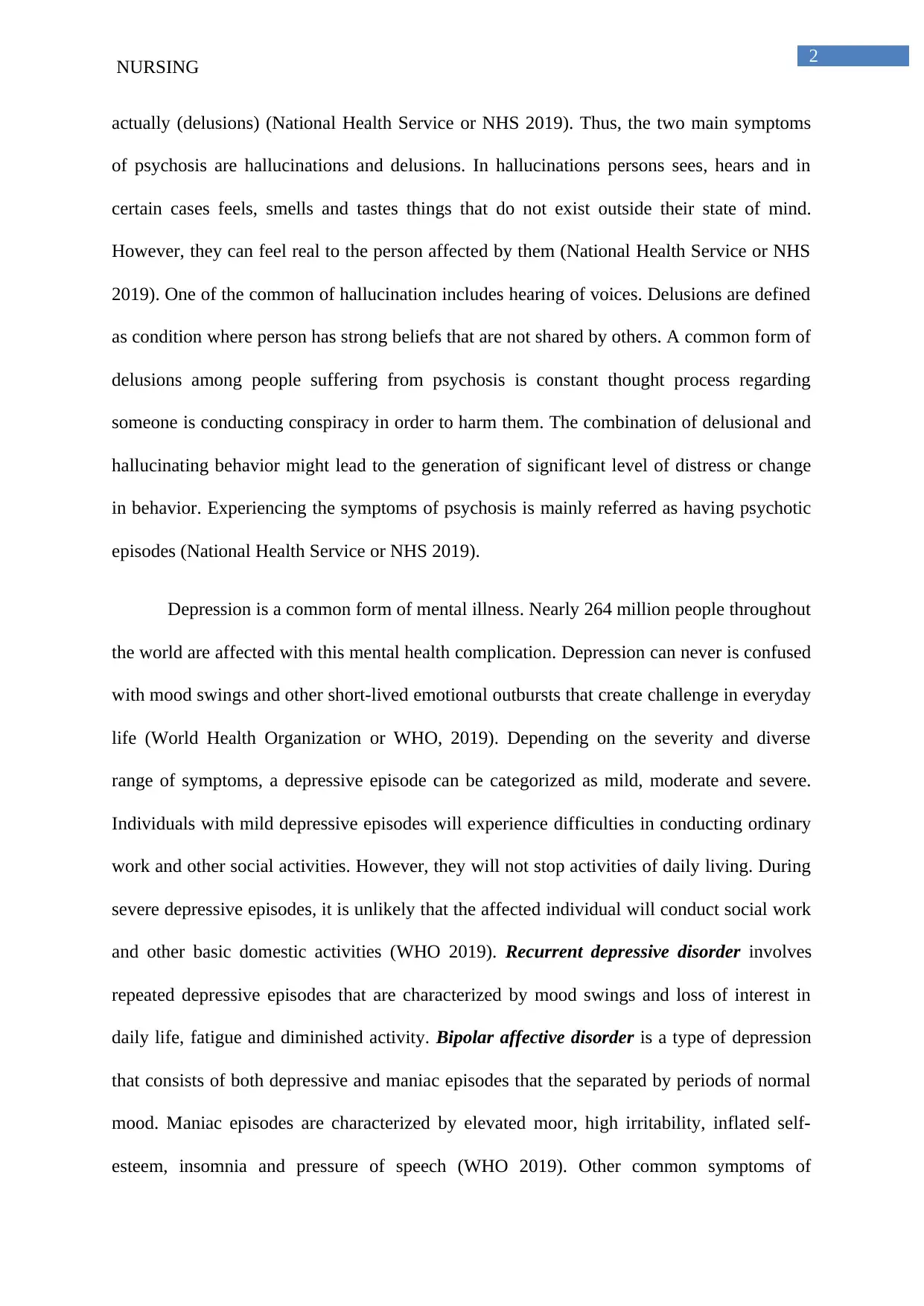
2
NURSING
actually (delusions) (National Health Service or NHS 2019). Thus, the two main symptoms
of psychosis are hallucinations and delusions. In hallucinations persons sees, hears and in
certain cases feels, smells and tastes things that do not exist outside their state of mind.
However, they can feel real to the person affected by them (National Health Service or NHS
2019). One of the common of hallucination includes hearing of voices. Delusions are defined
as condition where person has strong beliefs that are not shared by others. A common form of
delusions among people suffering from psychosis is constant thought process regarding
someone is conducting conspiracy in order to harm them. The combination of delusional and
hallucinating behavior might lead to the generation of significant level of distress or change
in behavior. Experiencing the symptoms of psychosis is mainly referred as having psychotic
episodes (National Health Service or NHS 2019).
Depression is a common form of mental illness. Nearly 264 million people throughout
the world are affected with this mental health complication. Depression can never is confused
with mood swings and other short-lived emotional outbursts that create challenge in everyday
life (World Health Organization or WHO, 2019). Depending on the severity and diverse
range of symptoms, a depressive episode can be categorized as mild, moderate and severe.
Individuals with mild depressive episodes will experience difficulties in conducting ordinary
work and other social activities. However, they will not stop activities of daily living. During
severe depressive episodes, it is unlikely that the affected individual will conduct social work
and other basic domestic activities (WHO 2019). Recurrent depressive disorder involves
repeated depressive episodes that are characterized by mood swings and loss of interest in
daily life, fatigue and diminished activity. Bipolar affective disorder is a type of depression
that consists of both depressive and maniac episodes that the separated by periods of normal
mood. Maniac episodes are characterized by elevated moor, high irritability, inflated self-
esteem, insomnia and pressure of speech (WHO 2019). Other common symptoms of
NURSING
actually (delusions) (National Health Service or NHS 2019). Thus, the two main symptoms
of psychosis are hallucinations and delusions. In hallucinations persons sees, hears and in
certain cases feels, smells and tastes things that do not exist outside their state of mind.
However, they can feel real to the person affected by them (National Health Service or NHS
2019). One of the common of hallucination includes hearing of voices. Delusions are defined
as condition where person has strong beliefs that are not shared by others. A common form of
delusions among people suffering from psychosis is constant thought process regarding
someone is conducting conspiracy in order to harm them. The combination of delusional and
hallucinating behavior might lead to the generation of significant level of distress or change
in behavior. Experiencing the symptoms of psychosis is mainly referred as having psychotic
episodes (National Health Service or NHS 2019).
Depression is a common form of mental illness. Nearly 264 million people throughout
the world are affected with this mental health complication. Depression can never is confused
with mood swings and other short-lived emotional outbursts that create challenge in everyday
life (World Health Organization or WHO, 2019). Depending on the severity and diverse
range of symptoms, a depressive episode can be categorized as mild, moderate and severe.
Individuals with mild depressive episodes will experience difficulties in conducting ordinary
work and other social activities. However, they will not stop activities of daily living. During
severe depressive episodes, it is unlikely that the affected individual will conduct social work
and other basic domestic activities (WHO 2019). Recurrent depressive disorder involves
repeated depressive episodes that are characterized by mood swings and loss of interest in
daily life, fatigue and diminished activity. Bipolar affective disorder is a type of depression
that consists of both depressive and maniac episodes that the separated by periods of normal
mood. Maniac episodes are characterized by elevated moor, high irritability, inflated self-
esteem, insomnia and pressure of speech (WHO 2019). Other common symptoms of
⊘ This is a preview!⊘
Do you want full access?
Subscribe today to unlock all pages.

Trusted by 1+ million students worldwide
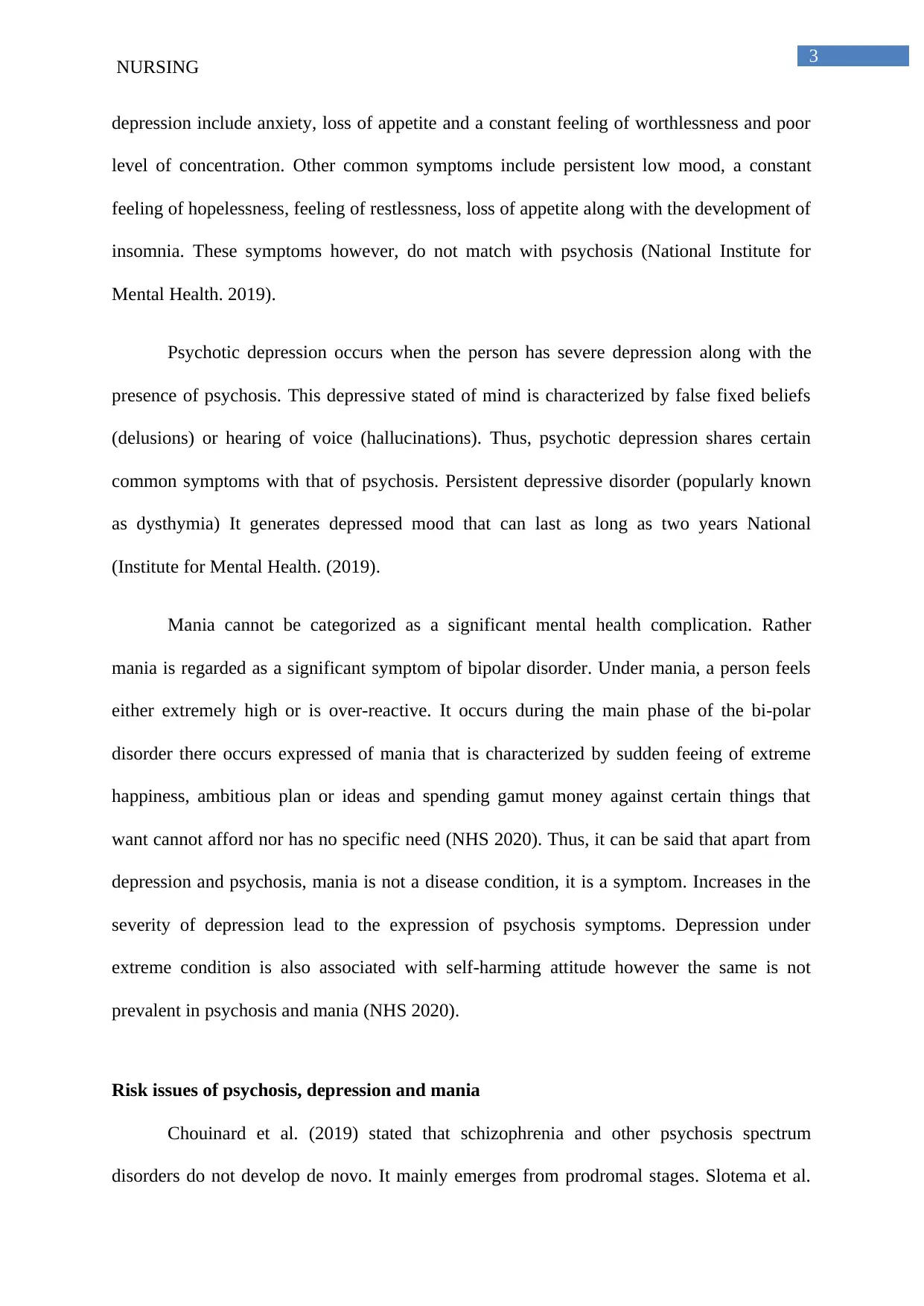
3
NURSING
depression include anxiety, loss of appetite and a constant feeling of worthlessness and poor
level of concentration. Other common symptoms include persistent low mood, a constant
feeling of hopelessness, feeling of restlessness, loss of appetite along with the development of
insomnia. These symptoms however, do not match with psychosis (National Institute for
Mental Health. 2019).
Psychotic depression occurs when the person has severe depression along with the
presence of psychosis. This depressive stated of mind is characterized by false fixed beliefs
(delusions) or hearing of voice (hallucinations). Thus, psychotic depression shares certain
common symptoms with that of psychosis. Persistent depressive disorder (popularly known
as dysthymia) It generates depressed mood that can last as long as two years National
(Institute for Mental Health. (2019).
Mania cannot be categorized as a significant mental health complication. Rather
mania is regarded as a significant symptom of bipolar disorder. Under mania, a person feels
either extremely high or is over-reactive. It occurs during the main phase of the bi-polar
disorder there occurs expressed of mania that is characterized by sudden feeing of extreme
happiness, ambitious plan or ideas and spending gamut money against certain things that
want cannot afford nor has no specific need (NHS 2020). Thus, it can be said that apart from
depression and psychosis, mania is not a disease condition, it is a symptom. Increases in the
severity of depression lead to the expression of psychosis symptoms. Depression under
extreme condition is also associated with self-harming attitude however the same is not
prevalent in psychosis and mania (NHS 2020).
Risk issues of psychosis, depression and mania
Chouinard et al. (2019) stated that schizophrenia and other psychosis spectrum
disorders do not develop de novo. It mainly emerges from prodromal stages. Slotema et al.
NURSING
depression include anxiety, loss of appetite and a constant feeling of worthlessness and poor
level of concentration. Other common symptoms include persistent low mood, a constant
feeling of hopelessness, feeling of restlessness, loss of appetite along with the development of
insomnia. These symptoms however, do not match with psychosis (National Institute for
Mental Health. 2019).
Psychotic depression occurs when the person has severe depression along with the
presence of psychosis. This depressive stated of mind is characterized by false fixed beliefs
(delusions) or hearing of voice (hallucinations). Thus, psychotic depression shares certain
common symptoms with that of psychosis. Persistent depressive disorder (popularly known
as dysthymia) It generates depressed mood that can last as long as two years National
(Institute for Mental Health. (2019).
Mania cannot be categorized as a significant mental health complication. Rather
mania is regarded as a significant symptom of bipolar disorder. Under mania, a person feels
either extremely high or is over-reactive. It occurs during the main phase of the bi-polar
disorder there occurs expressed of mania that is characterized by sudden feeing of extreme
happiness, ambitious plan or ideas and spending gamut money against certain things that
want cannot afford nor has no specific need (NHS 2020). Thus, it can be said that apart from
depression and psychosis, mania is not a disease condition, it is a symptom. Increases in the
severity of depression lead to the expression of psychosis symptoms. Depression under
extreme condition is also associated with self-harming attitude however the same is not
prevalent in psychosis and mania (NHS 2020).
Risk issues of psychosis, depression and mania
Chouinard et al. (2019) stated that schizophrenia and other psychosis spectrum
disorders do not develop de novo. It mainly emerges from prodromal stages. Slotema et al.
Paraphrase This Document
Need a fresh take? Get an instant paraphrase of this document with our AI Paraphraser
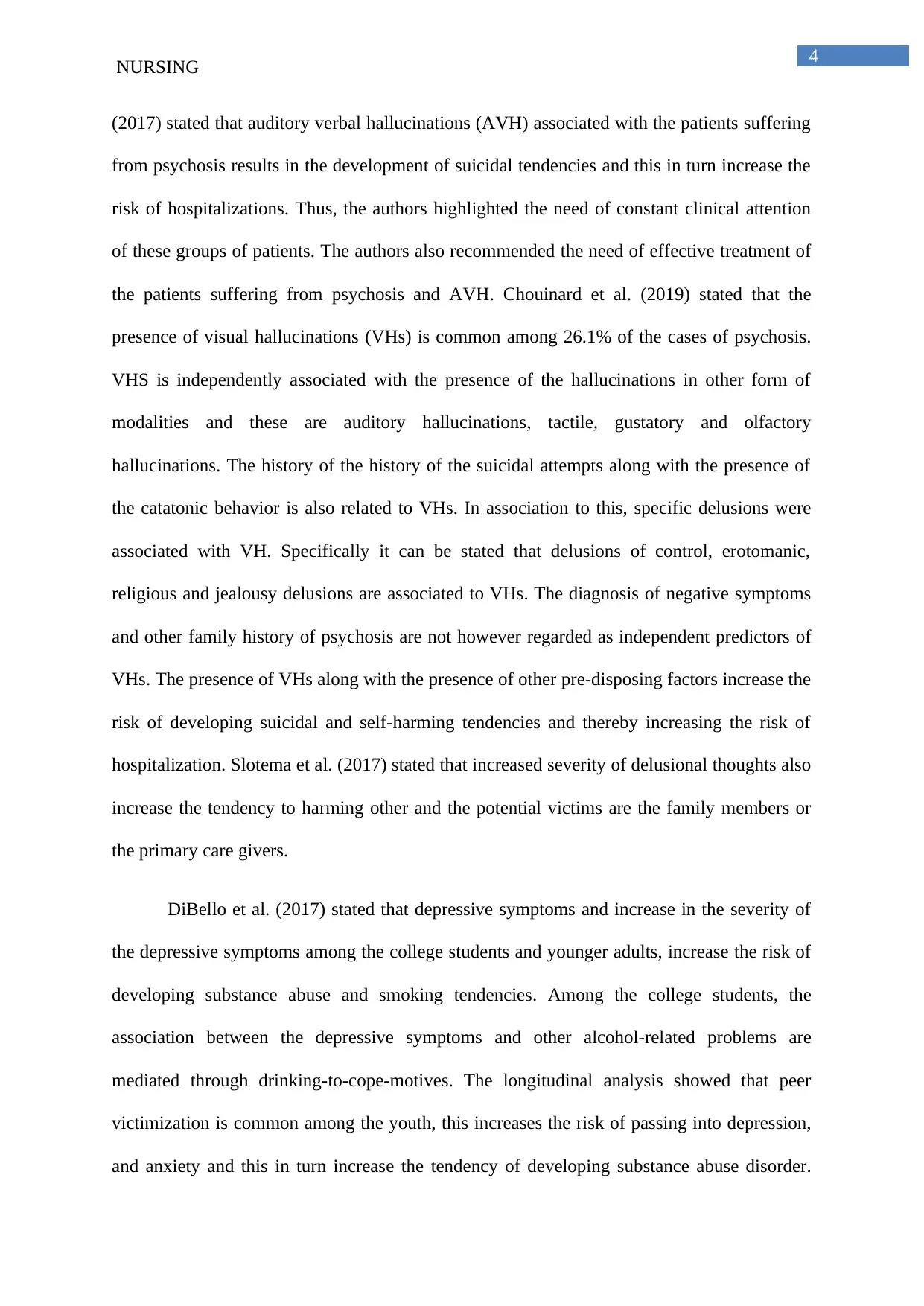
4
NURSING
(2017) stated that auditory verbal hallucinations (AVH) associated with the patients suffering
from psychosis results in the development of suicidal tendencies and this in turn increase the
risk of hospitalizations. Thus, the authors highlighted the need of constant clinical attention
of these groups of patients. The authors also recommended the need of effective treatment of
the patients suffering from psychosis and AVH. Chouinard et al. (2019) stated that the
presence of visual hallucinations (VHs) is common among 26.1% of the cases of psychosis.
VHS is independently associated with the presence of the hallucinations in other form of
modalities and these are auditory hallucinations, tactile, gustatory and olfactory
hallucinations. The history of the history of the suicidal attempts along with the presence of
the catatonic behavior is also related to VHs. In association to this, specific delusions were
associated with VH. Specifically it can be stated that delusions of control, erotomanic,
religious and jealousy delusions are associated to VHs. The diagnosis of negative symptoms
and other family history of psychosis are not however regarded as independent predictors of
VHs. The presence of VHs along with the presence of other pre-disposing factors increase the
risk of developing suicidal and self-harming tendencies and thereby increasing the risk of
hospitalization. Slotema et al. (2017) stated that increased severity of delusional thoughts also
increase the tendency to harming other and the potential victims are the family members or
the primary care givers.
DiBello et al. (2017) stated that depressive symptoms and increase in the severity of
the depressive symptoms among the college students and younger adults, increase the risk of
developing substance abuse and smoking tendencies. Among the college students, the
association between the depressive symptoms and other alcohol-related problems are
mediated through drinking-to-cope-motives. The longitudinal analysis showed that peer
victimization is common among the youth, this increases the risk of passing into depression,
and anxiety and this in turn increase the tendency of developing substance abuse disorder.
NURSING
(2017) stated that auditory verbal hallucinations (AVH) associated with the patients suffering
from psychosis results in the development of suicidal tendencies and this in turn increase the
risk of hospitalizations. Thus, the authors highlighted the need of constant clinical attention
of these groups of patients. The authors also recommended the need of effective treatment of
the patients suffering from psychosis and AVH. Chouinard et al. (2019) stated that the
presence of visual hallucinations (VHs) is common among 26.1% of the cases of psychosis.
VHS is independently associated with the presence of the hallucinations in other form of
modalities and these are auditory hallucinations, tactile, gustatory and olfactory
hallucinations. The history of the history of the suicidal attempts along with the presence of
the catatonic behavior is also related to VHs. In association to this, specific delusions were
associated with VH. Specifically it can be stated that delusions of control, erotomanic,
religious and jealousy delusions are associated to VHs. The diagnosis of negative symptoms
and other family history of psychosis are not however regarded as independent predictors of
VHs. The presence of VHs along with the presence of other pre-disposing factors increase the
risk of developing suicidal and self-harming tendencies and thereby increasing the risk of
hospitalization. Slotema et al. (2017) stated that increased severity of delusional thoughts also
increase the tendency to harming other and the potential victims are the family members or
the primary care givers.
DiBello et al. (2017) stated that depressive symptoms and increase in the severity of
the depressive symptoms among the college students and younger adults, increase the risk of
developing substance abuse and smoking tendencies. Among the college students, the
association between the depressive symptoms and other alcohol-related problems are
mediated through drinking-to-cope-motives. The longitudinal analysis showed that peer
victimization is common among the youth, this increases the risk of passing into depression,
and anxiety and this in turn increase the tendency of developing substance abuse disorder.
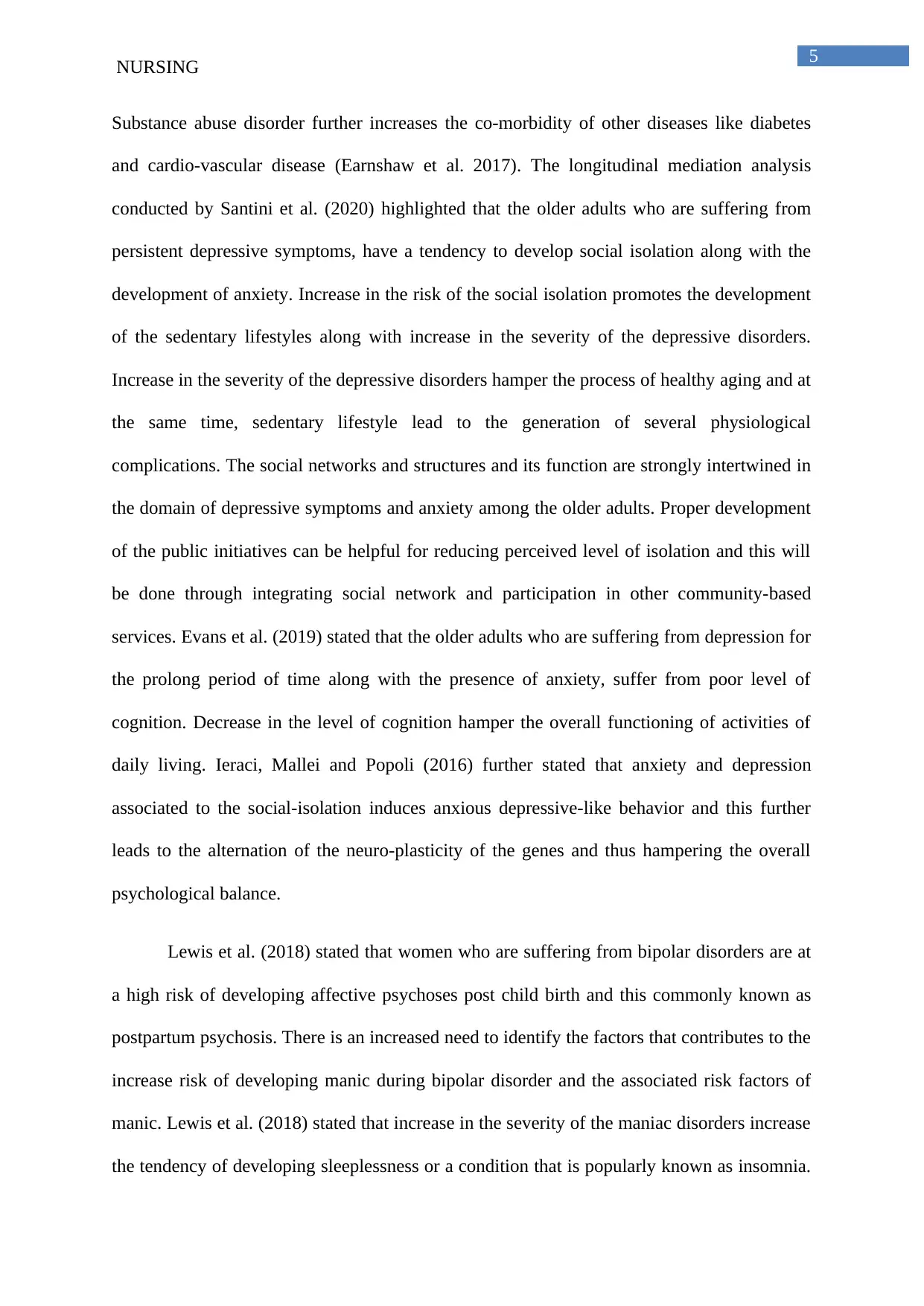
5
NURSING
Substance abuse disorder further increases the co-morbidity of other diseases like diabetes
and cardio-vascular disease (Earnshaw et al. 2017). The longitudinal mediation analysis
conducted by Santini et al. (2020) highlighted that the older adults who are suffering from
persistent depressive symptoms, have a tendency to develop social isolation along with the
development of anxiety. Increase in the risk of the social isolation promotes the development
of the sedentary lifestyles along with increase in the severity of the depressive disorders.
Increase in the severity of the depressive disorders hamper the process of healthy aging and at
the same time, sedentary lifestyle lead to the generation of several physiological
complications. The social networks and structures and its function are strongly intertwined in
the domain of depressive symptoms and anxiety among the older adults. Proper development
of the public initiatives can be helpful for reducing perceived level of isolation and this will
be done through integrating social network and participation in other community-based
services. Evans et al. (2019) stated that the older adults who are suffering from depression for
the prolong period of time along with the presence of anxiety, suffer from poor level of
cognition. Decrease in the level of cognition hamper the overall functioning of activities of
daily living. Ieraci, Mallei and Popoli (2016) further stated that anxiety and depression
associated to the social-isolation induces anxious depressive-like behavior and this further
leads to the alternation of the neuro-plasticity of the genes and thus hampering the overall
psychological balance.
Lewis et al. (2018) stated that women who are suffering from bipolar disorders are at
a high risk of developing affective psychoses post child birth and this commonly known as
postpartum psychosis. There is an increased need to identify the factors that contributes to the
increase risk of developing manic during bipolar disorder and the associated risk factors of
manic. Lewis et al. (2018) stated that increase in the severity of the maniac disorders increase
the tendency of developing sleeplessness or a condition that is popularly known as insomnia.
NURSING
Substance abuse disorder further increases the co-morbidity of other diseases like diabetes
and cardio-vascular disease (Earnshaw et al. 2017). The longitudinal mediation analysis
conducted by Santini et al. (2020) highlighted that the older adults who are suffering from
persistent depressive symptoms, have a tendency to develop social isolation along with the
development of anxiety. Increase in the risk of the social isolation promotes the development
of the sedentary lifestyles along with increase in the severity of the depressive disorders.
Increase in the severity of the depressive disorders hamper the process of healthy aging and at
the same time, sedentary lifestyle lead to the generation of several physiological
complications. The social networks and structures and its function are strongly intertwined in
the domain of depressive symptoms and anxiety among the older adults. Proper development
of the public initiatives can be helpful for reducing perceived level of isolation and this will
be done through integrating social network and participation in other community-based
services. Evans et al. (2019) stated that the older adults who are suffering from depression for
the prolong period of time along with the presence of anxiety, suffer from poor level of
cognition. Decrease in the level of cognition hamper the overall functioning of activities of
daily living. Ieraci, Mallei and Popoli (2016) further stated that anxiety and depression
associated to the social-isolation induces anxious depressive-like behavior and this further
leads to the alternation of the neuro-plasticity of the genes and thus hampering the overall
psychological balance.
Lewis et al. (2018) stated that women who are suffering from bipolar disorders are at
a high risk of developing affective psychoses post child birth and this commonly known as
postpartum psychosis. There is an increased need to identify the factors that contributes to the
increase risk of developing manic during bipolar disorder and the associated risk factors of
manic. Lewis et al. (2018) stated that increase in the severity of the maniac disorders increase
the tendency of developing sleeplessness or a condition that is popularly known as insomnia.
⊘ This is a preview!⊘
Do you want full access?
Subscribe today to unlock all pages.

Trusted by 1+ million students worldwide
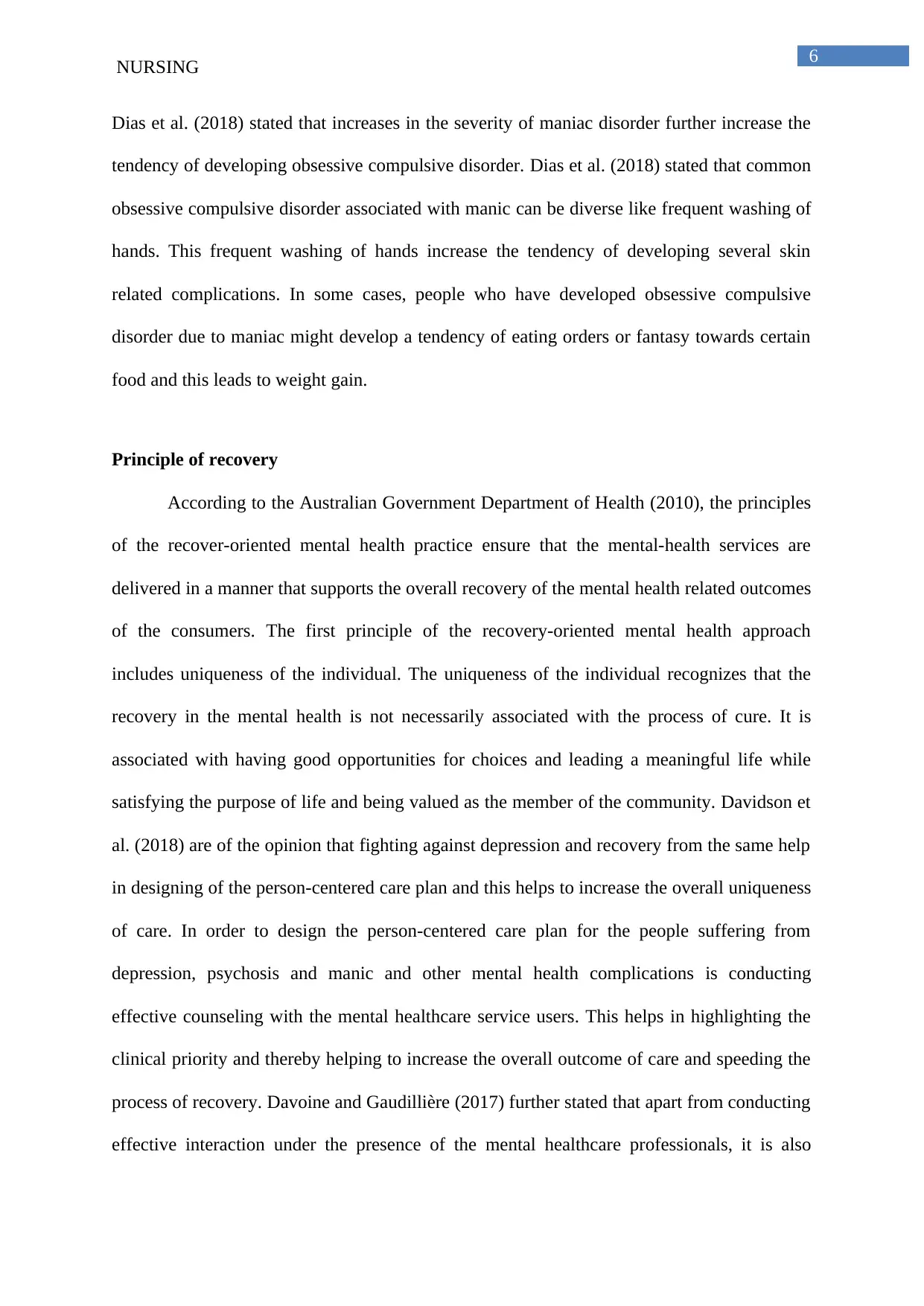
6
NURSING
Dias et al. (2018) stated that increases in the severity of maniac disorder further increase the
tendency of developing obsessive compulsive disorder. Dias et al. (2018) stated that common
obsessive compulsive disorder associated with manic can be diverse like frequent washing of
hands. This frequent washing of hands increase the tendency of developing several skin
related complications. In some cases, people who have developed obsessive compulsive
disorder due to maniac might develop a tendency of eating orders or fantasy towards certain
food and this leads to weight gain.
Principle of recovery
According to the Australian Government Department of Health (2010), the principles
of the recover-oriented mental health practice ensure that the mental-health services are
delivered in a manner that supports the overall recovery of the mental health related outcomes
of the consumers. The first principle of the recovery-oriented mental health approach
includes uniqueness of the individual. The uniqueness of the individual recognizes that the
recovery in the mental health is not necessarily associated with the process of cure. It is
associated with having good opportunities for choices and leading a meaningful life while
satisfying the purpose of life and being valued as the member of the community. Davidson et
al. (2018) are of the opinion that fighting against depression and recovery from the same help
in designing of the person-centered care plan and this helps to increase the overall uniqueness
of care. In order to design the person-centered care plan for the people suffering from
depression, psychosis and manic and other mental health complications is conducting
effective counseling with the mental healthcare service users. This helps in highlighting the
clinical priority and thereby helping to increase the overall outcome of care and speeding the
process of recovery. Davoine and Gaudillière (2017) further stated that apart from conducting
effective interaction under the presence of the mental healthcare professionals, it is also
NURSING
Dias et al. (2018) stated that increases in the severity of maniac disorder further increase the
tendency of developing obsessive compulsive disorder. Dias et al. (2018) stated that common
obsessive compulsive disorder associated with manic can be diverse like frequent washing of
hands. This frequent washing of hands increase the tendency of developing several skin
related complications. In some cases, people who have developed obsessive compulsive
disorder due to maniac might develop a tendency of eating orders or fantasy towards certain
food and this leads to weight gain.
Principle of recovery
According to the Australian Government Department of Health (2010), the principles
of the recover-oriented mental health practice ensure that the mental-health services are
delivered in a manner that supports the overall recovery of the mental health related outcomes
of the consumers. The first principle of the recovery-oriented mental health approach
includes uniqueness of the individual. The uniqueness of the individual recognizes that the
recovery in the mental health is not necessarily associated with the process of cure. It is
associated with having good opportunities for choices and leading a meaningful life while
satisfying the purpose of life and being valued as the member of the community. Davidson et
al. (2018) are of the opinion that fighting against depression and recovery from the same help
in designing of the person-centered care plan and this helps to increase the overall uniqueness
of care. In order to design the person-centered care plan for the people suffering from
depression, psychosis and manic and other mental health complications is conducting
effective counseling with the mental healthcare service users. This helps in highlighting the
clinical priority and thereby helping to increase the overall outcome of care and speeding the
process of recovery. Davoine and Gaudillière (2017) further stated that apart from conducting
effective interaction under the presence of the mental healthcare professionals, it is also
Paraphrase This Document
Need a fresh take? Get an instant paraphrase of this document with our AI Paraphraser
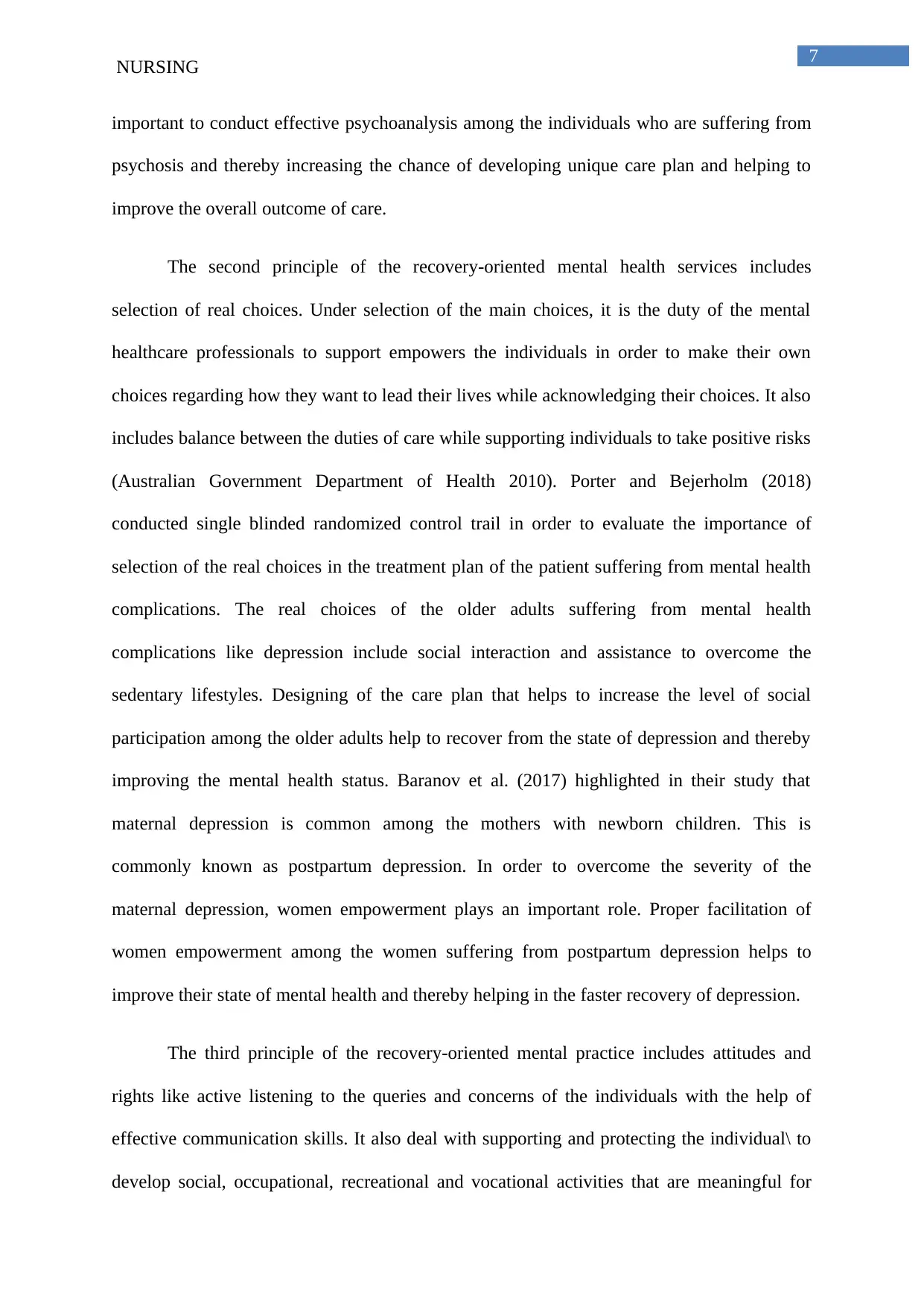
7
NURSING
important to conduct effective psychoanalysis among the individuals who are suffering from
psychosis and thereby increasing the chance of developing unique care plan and helping to
improve the overall outcome of care.
The second principle of the recovery-oriented mental health services includes
selection of real choices. Under selection of the main choices, it is the duty of the mental
healthcare professionals to support empowers the individuals in order to make their own
choices regarding how they want to lead their lives while acknowledging their choices. It also
includes balance between the duties of care while supporting individuals to take positive risks
(Australian Government Department of Health 2010). Porter and Bejerholm (2018)
conducted single blinded randomized control trail in order to evaluate the importance of
selection of the real choices in the treatment plan of the patient suffering from mental health
complications. The real choices of the older adults suffering from mental health
complications like depression include social interaction and assistance to overcome the
sedentary lifestyles. Designing of the care plan that helps to increase the level of social
participation among the older adults help to recover from the state of depression and thereby
improving the mental health status. Baranov et al. (2017) highlighted in their study that
maternal depression is common among the mothers with newborn children. This is
commonly known as postpartum depression. In order to overcome the severity of the
maternal depression, women empowerment plays an important role. Proper facilitation of
women empowerment among the women suffering from postpartum depression helps to
improve their state of mental health and thereby helping in the faster recovery of depression.
The third principle of the recovery-oriented mental practice includes attitudes and
rights like active listening to the queries and concerns of the individuals with the help of
effective communication skills. It also deal with supporting and protecting the individual\ to
develop social, occupational, recreational and vocational activities that are meaningful for
NURSING
important to conduct effective psychoanalysis among the individuals who are suffering from
psychosis and thereby increasing the chance of developing unique care plan and helping to
improve the overall outcome of care.
The second principle of the recovery-oriented mental health services includes
selection of real choices. Under selection of the main choices, it is the duty of the mental
healthcare professionals to support empowers the individuals in order to make their own
choices regarding how they want to lead their lives while acknowledging their choices. It also
includes balance between the duties of care while supporting individuals to take positive risks
(Australian Government Department of Health 2010). Porter and Bejerholm (2018)
conducted single blinded randomized control trail in order to evaluate the importance of
selection of the real choices in the treatment plan of the patient suffering from mental health
complications. The real choices of the older adults suffering from mental health
complications like depression include social interaction and assistance to overcome the
sedentary lifestyles. Designing of the care plan that helps to increase the level of social
participation among the older adults help to recover from the state of depression and thereby
improving the mental health status. Baranov et al. (2017) highlighted in their study that
maternal depression is common among the mothers with newborn children. This is
commonly known as postpartum depression. In order to overcome the severity of the
maternal depression, women empowerment plays an important role. Proper facilitation of
women empowerment among the women suffering from postpartum depression helps to
improve their state of mental health and thereby helping in the faster recovery of depression.
The third principle of the recovery-oriented mental practice includes attitudes and
rights like active listening to the queries and concerns of the individuals with the help of
effective communication skills. It also deal with supporting and protecting the individual\ to
develop social, occupational, recreational and vocational activities that are meaningful for
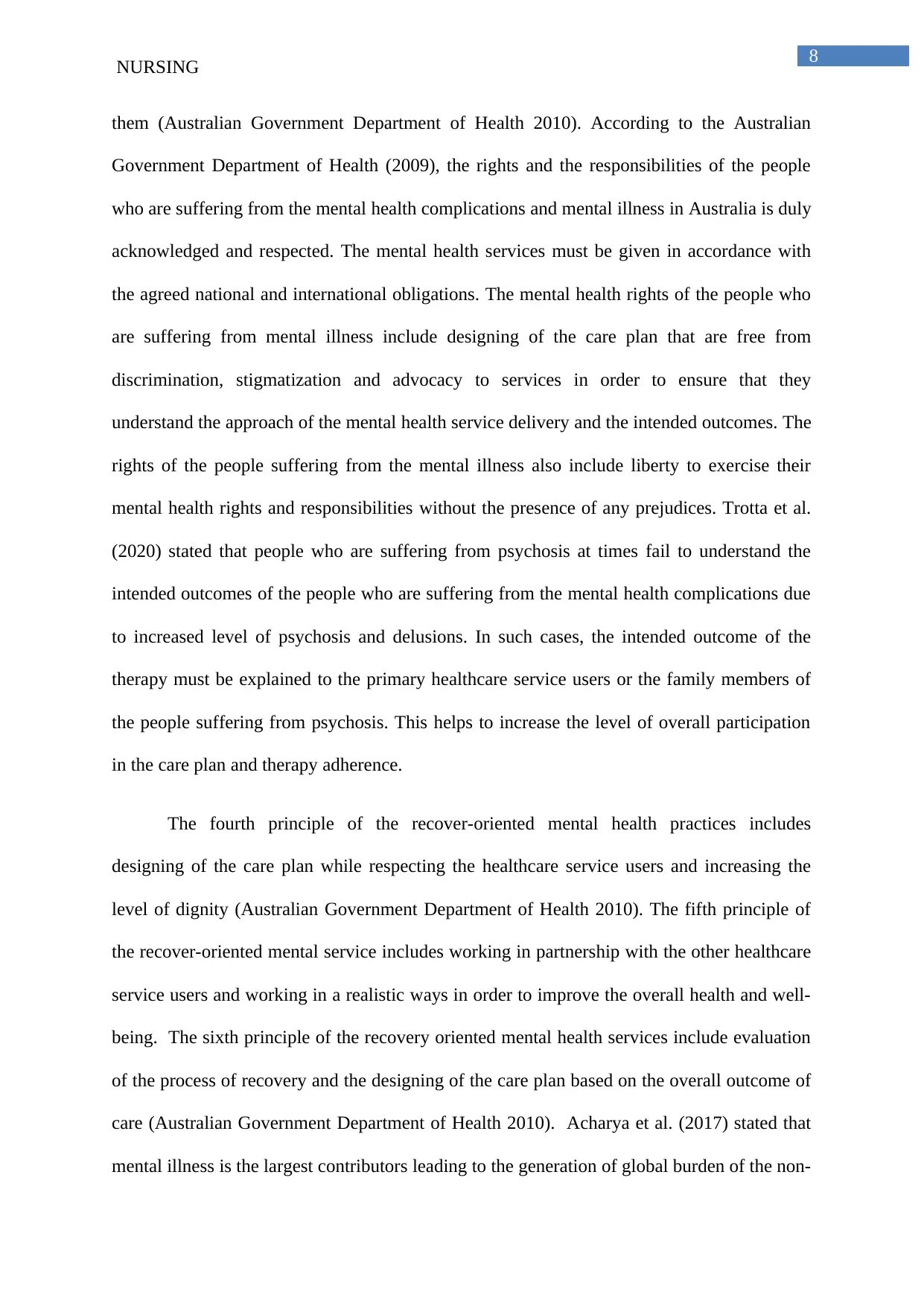
8
NURSING
them (Australian Government Department of Health 2010). According to the Australian
Government Department of Health (2009), the rights and the responsibilities of the people
who are suffering from the mental health complications and mental illness in Australia is duly
acknowledged and respected. The mental health services must be given in accordance with
the agreed national and international obligations. The mental health rights of the people who
are suffering from mental illness include designing of the care plan that are free from
discrimination, stigmatization and advocacy to services in order to ensure that they
understand the approach of the mental health service delivery and the intended outcomes. The
rights of the people suffering from the mental illness also include liberty to exercise their
mental health rights and responsibilities without the presence of any prejudices. Trotta et al.
(2020) stated that people who are suffering from psychosis at times fail to understand the
intended outcomes of the people who are suffering from the mental health complications due
to increased level of psychosis and delusions. In such cases, the intended outcome of the
therapy must be explained to the primary healthcare service users or the family members of
the people suffering from psychosis. This helps to increase the level of overall participation
in the care plan and therapy adherence.
The fourth principle of the recover-oriented mental health practices includes
designing of the care plan while respecting the healthcare service users and increasing the
level of dignity (Australian Government Department of Health 2010). The fifth principle of
the recover-oriented mental service includes working in partnership with the other healthcare
service users and working in a realistic ways in order to improve the overall health and well-
being. The sixth principle of the recovery oriented mental health services include evaluation
of the process of recovery and the designing of the care plan based on the overall outcome of
care (Australian Government Department of Health 2010). Acharya et al. (2017) stated that
mental illness is the largest contributors leading to the generation of global burden of the non-
NURSING
them (Australian Government Department of Health 2010). According to the Australian
Government Department of Health (2009), the rights and the responsibilities of the people
who are suffering from the mental health complications and mental illness in Australia is duly
acknowledged and respected. The mental health services must be given in accordance with
the agreed national and international obligations. The mental health rights of the people who
are suffering from mental illness include designing of the care plan that are free from
discrimination, stigmatization and advocacy to services in order to ensure that they
understand the approach of the mental health service delivery and the intended outcomes. The
rights of the people suffering from the mental illness also include liberty to exercise their
mental health rights and responsibilities without the presence of any prejudices. Trotta et al.
(2020) stated that people who are suffering from psychosis at times fail to understand the
intended outcomes of the people who are suffering from the mental health complications due
to increased level of psychosis and delusions. In such cases, the intended outcome of the
therapy must be explained to the primary healthcare service users or the family members of
the people suffering from psychosis. This helps to increase the level of overall participation
in the care plan and therapy adherence.
The fourth principle of the recover-oriented mental health practices includes
designing of the care plan while respecting the healthcare service users and increasing the
level of dignity (Australian Government Department of Health 2010). The fifth principle of
the recover-oriented mental service includes working in partnership with the other healthcare
service users and working in a realistic ways in order to improve the overall health and well-
being. The sixth principle of the recovery oriented mental health services include evaluation
of the process of recovery and the designing of the care plan based on the overall outcome of
care (Australian Government Department of Health 2010). Acharya et al. (2017) stated that
mental illness is the largest contributors leading to the generation of global burden of the non-
⊘ This is a preview!⊘
Do you want full access?
Subscribe today to unlock all pages.

Trusted by 1+ million students worldwide
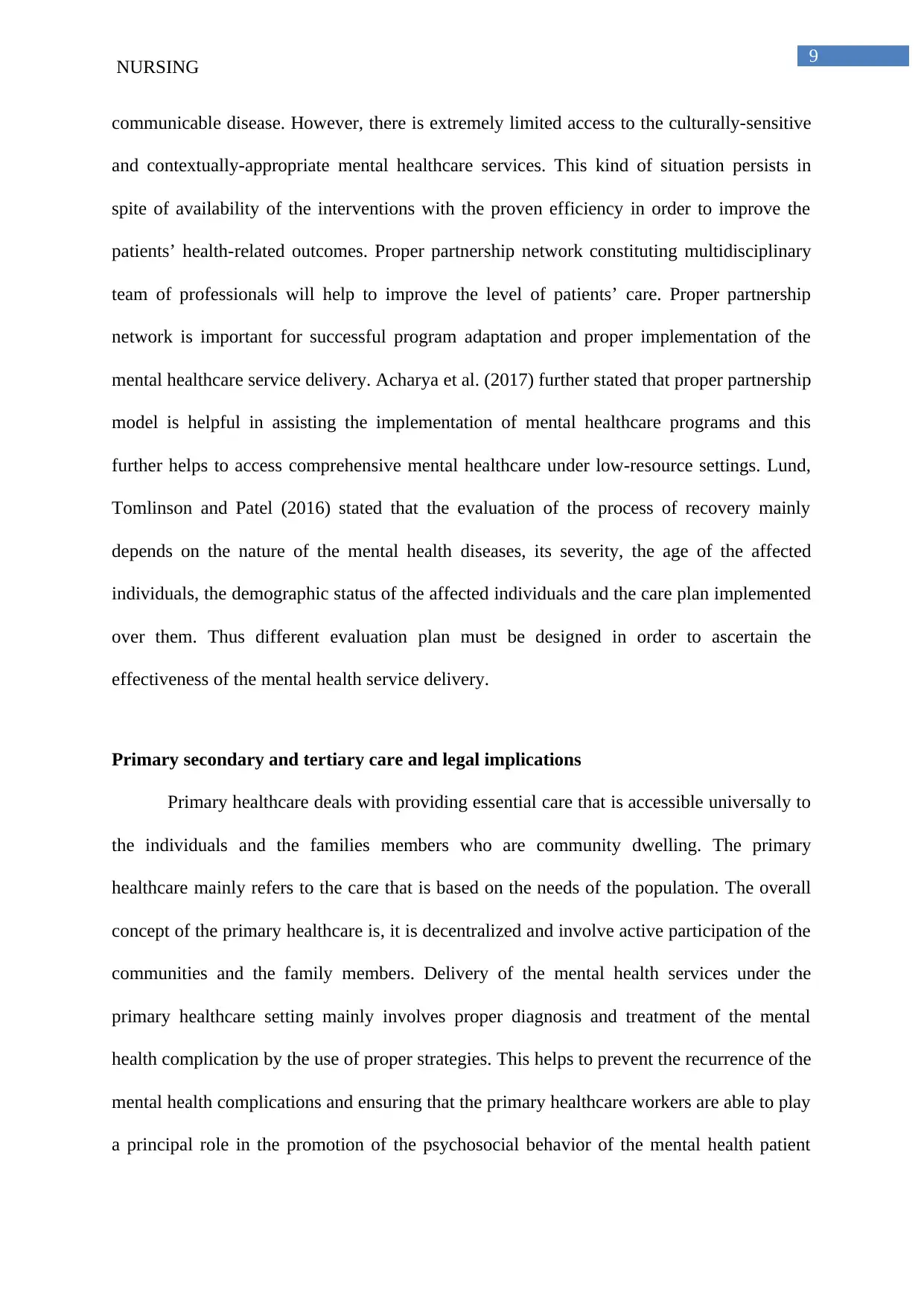
9
NURSING
communicable disease. However, there is extremely limited access to the culturally-sensitive
and contextually-appropriate mental healthcare services. This kind of situation persists in
spite of availability of the interventions with the proven efficiency in order to improve the
patients’ health-related outcomes. Proper partnership network constituting multidisciplinary
team of professionals will help to improve the level of patients’ care. Proper partnership
network is important for successful program adaptation and proper implementation of the
mental healthcare service delivery. Acharya et al. (2017) further stated that proper partnership
model is helpful in assisting the implementation of mental healthcare programs and this
further helps to access comprehensive mental healthcare under low-resource settings. Lund,
Tomlinson and Patel (2016) stated that the evaluation of the process of recovery mainly
depends on the nature of the mental health diseases, its severity, the age of the affected
individuals, the demographic status of the affected individuals and the care plan implemented
over them. Thus different evaluation plan must be designed in order to ascertain the
effectiveness of the mental health service delivery.
Primary secondary and tertiary care and legal implications
Primary healthcare deals with providing essential care that is accessible universally to
the individuals and the families members who are community dwelling. The primary
healthcare mainly refers to the care that is based on the needs of the population. The overall
concept of the primary healthcare is, it is decentralized and involve active participation of the
communities and the family members. Delivery of the mental health services under the
primary healthcare setting mainly involves proper diagnosis and treatment of the mental
health complication by the use of proper strategies. This helps to prevent the recurrence of the
mental health complications and ensuring that the primary healthcare workers are able to play
a principal role in the promotion of the psychosocial behavior of the mental health patient
NURSING
communicable disease. However, there is extremely limited access to the culturally-sensitive
and contextually-appropriate mental healthcare services. This kind of situation persists in
spite of availability of the interventions with the proven efficiency in order to improve the
patients’ health-related outcomes. Proper partnership network constituting multidisciplinary
team of professionals will help to improve the level of patients’ care. Proper partnership
network is important for successful program adaptation and proper implementation of the
mental healthcare service delivery. Acharya et al. (2017) further stated that proper partnership
model is helpful in assisting the implementation of mental healthcare programs and this
further helps to access comprehensive mental healthcare under low-resource settings. Lund,
Tomlinson and Patel (2016) stated that the evaluation of the process of recovery mainly
depends on the nature of the mental health diseases, its severity, the age of the affected
individuals, the demographic status of the affected individuals and the care plan implemented
over them. Thus different evaluation plan must be designed in order to ascertain the
effectiveness of the mental health service delivery.
Primary secondary and tertiary care and legal implications
Primary healthcare deals with providing essential care that is accessible universally to
the individuals and the families members who are community dwelling. The primary
healthcare mainly refers to the care that is based on the needs of the population. The overall
concept of the primary healthcare is, it is decentralized and involve active participation of the
communities and the family members. Delivery of the mental health services under the
primary healthcare setting mainly involves proper diagnosis and treatment of the mental
health complication by the use of proper strategies. This helps to prevent the recurrence of the
mental health complications and ensuring that the primary healthcare workers are able to play
a principal role in the promotion of the psychosocial behavior of the mental health patient
Paraphrase This Document
Need a fresh take? Get an instant paraphrase of this document with our AI Paraphraser
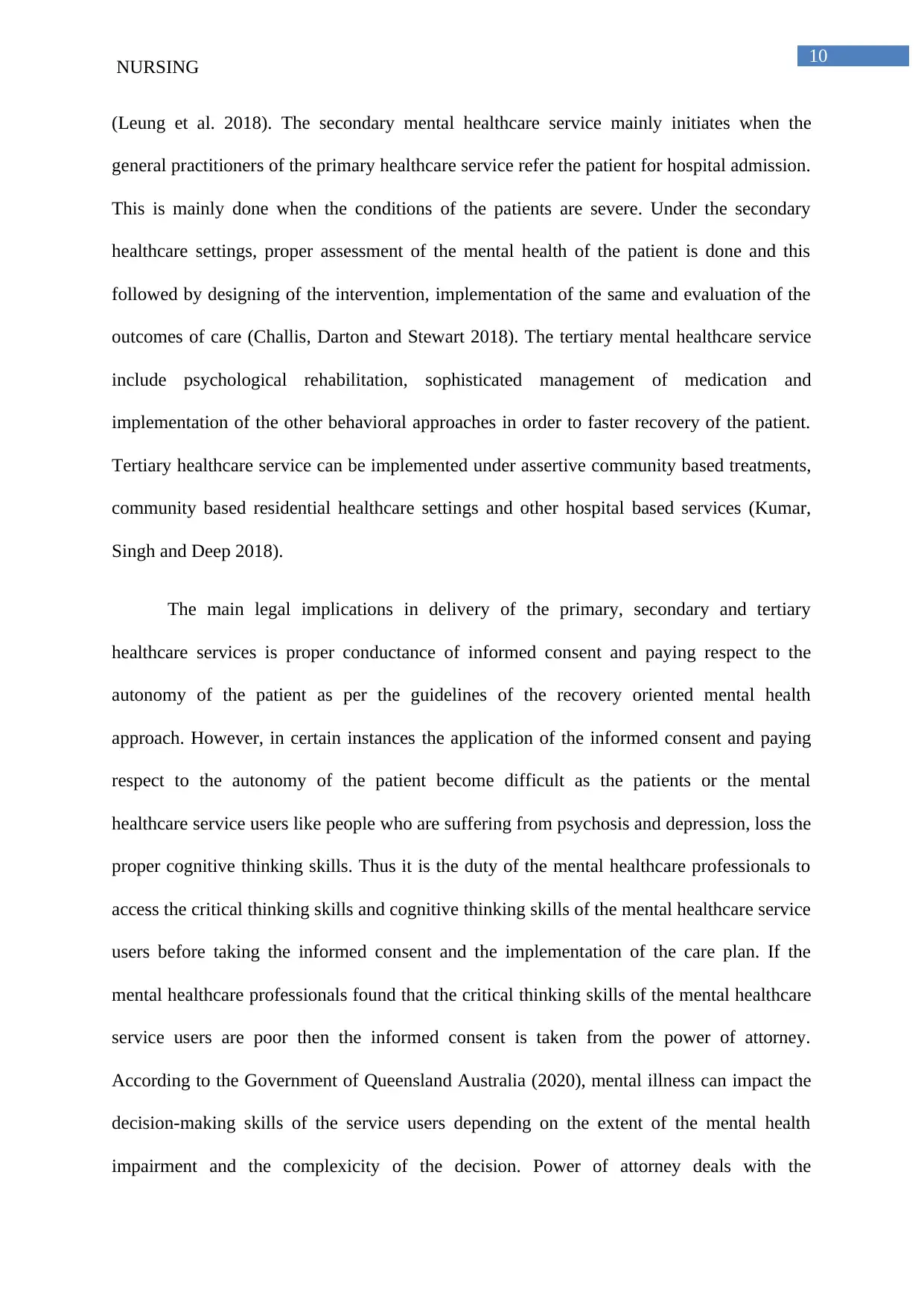
10
NURSING
(Leung et al. 2018). The secondary mental healthcare service mainly initiates when the
general practitioners of the primary healthcare service refer the patient for hospital admission.
This is mainly done when the conditions of the patients are severe. Under the secondary
healthcare settings, proper assessment of the mental health of the patient is done and this
followed by designing of the intervention, implementation of the same and evaluation of the
outcomes of care (Challis, Darton and Stewart 2018). The tertiary mental healthcare service
include psychological rehabilitation, sophisticated management of medication and
implementation of the other behavioral approaches in order to faster recovery of the patient.
Tertiary healthcare service can be implemented under assertive community based treatments,
community based residential healthcare settings and other hospital based services (Kumar,
Singh and Deep 2018).
The main legal implications in delivery of the primary, secondary and tertiary
healthcare services is proper conductance of informed consent and paying respect to the
autonomy of the patient as per the guidelines of the recovery oriented mental health
approach. However, in certain instances the application of the informed consent and paying
respect to the autonomy of the patient become difficult as the patients or the mental
healthcare service users like people who are suffering from psychosis and depression, loss the
proper cognitive thinking skills. Thus it is the duty of the mental healthcare professionals to
access the critical thinking skills and cognitive thinking skills of the mental healthcare service
users before taking the informed consent and the implementation of the care plan. If the
mental healthcare professionals found that the critical thinking skills of the mental healthcare
service users are poor then the informed consent is taken from the power of attorney.
According to the Government of Queensland Australia (2020), mental illness can impact the
decision-making skills of the service users depending on the extent of the mental health
impairment and the complexicity of the decision. Power of attorney deals with the
NURSING
(Leung et al. 2018). The secondary mental healthcare service mainly initiates when the
general practitioners of the primary healthcare service refer the patient for hospital admission.
This is mainly done when the conditions of the patients are severe. Under the secondary
healthcare settings, proper assessment of the mental health of the patient is done and this
followed by designing of the intervention, implementation of the same and evaluation of the
outcomes of care (Challis, Darton and Stewart 2018). The tertiary mental healthcare service
include psychological rehabilitation, sophisticated management of medication and
implementation of the other behavioral approaches in order to faster recovery of the patient.
Tertiary healthcare service can be implemented under assertive community based treatments,
community based residential healthcare settings and other hospital based services (Kumar,
Singh and Deep 2018).
The main legal implications in delivery of the primary, secondary and tertiary
healthcare services is proper conductance of informed consent and paying respect to the
autonomy of the patient as per the guidelines of the recovery oriented mental health
approach. However, in certain instances the application of the informed consent and paying
respect to the autonomy of the patient become difficult as the patients or the mental
healthcare service users like people who are suffering from psychosis and depression, loss the
proper cognitive thinking skills. Thus it is the duty of the mental healthcare professionals to
access the critical thinking skills and cognitive thinking skills of the mental healthcare service
users before taking the informed consent and the implementation of the care plan. If the
mental healthcare professionals found that the critical thinking skills of the mental healthcare
service users are poor then the informed consent is taken from the power of attorney.
According to the Government of Queensland Australia (2020), mental illness can impact the
decision-making skills of the service users depending on the extent of the mental health
impairment and the complexicity of the decision. Power of attorney deals with the
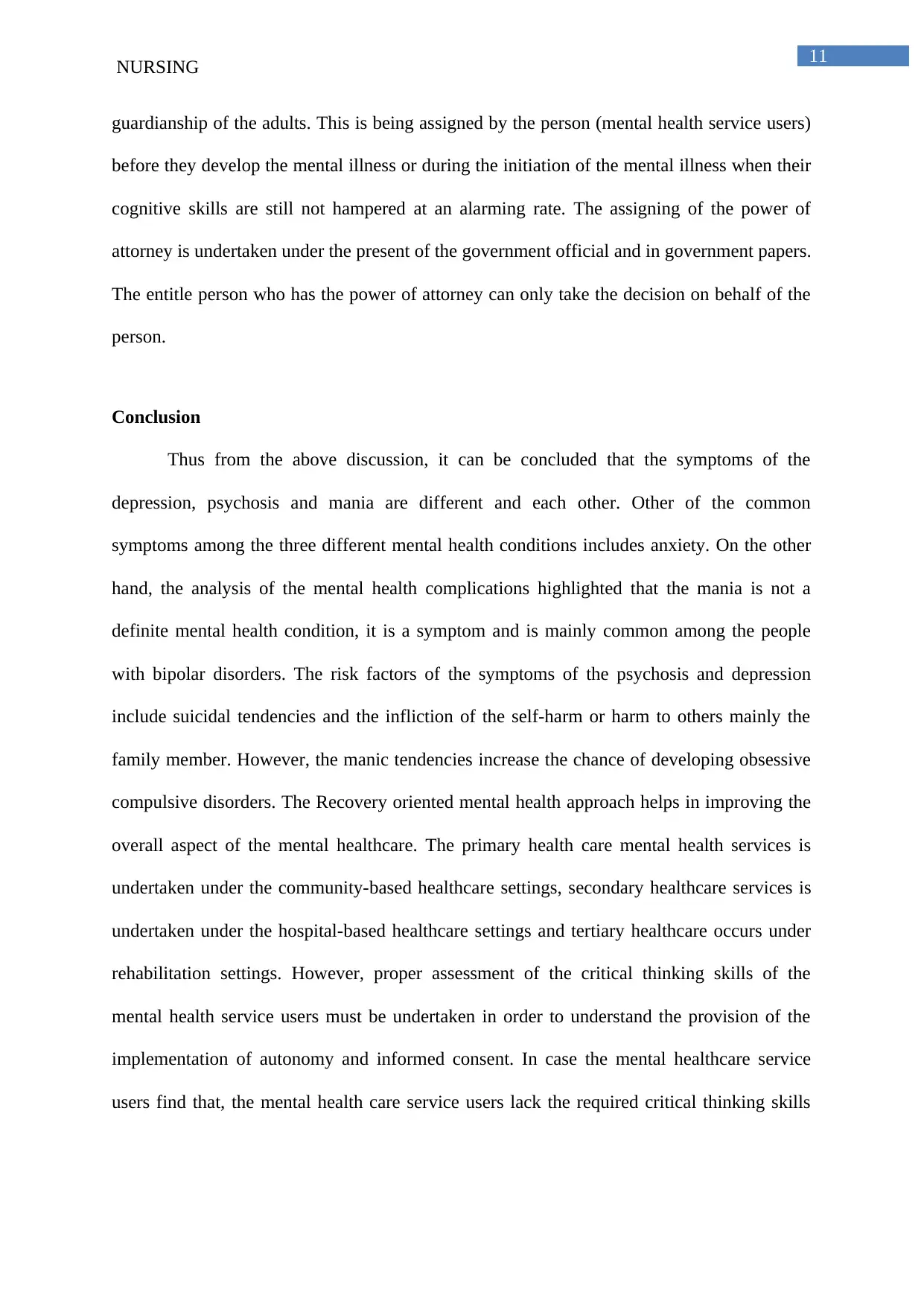
11
NURSING
guardianship of the adults. This is being assigned by the person (mental health service users)
before they develop the mental illness or during the initiation of the mental illness when their
cognitive skills are still not hampered at an alarming rate. The assigning of the power of
attorney is undertaken under the present of the government official and in government papers.
The entitle person who has the power of attorney can only take the decision on behalf of the
person.
Conclusion
Thus from the above discussion, it can be concluded that the symptoms of the
depression, psychosis and mania are different and each other. Other of the common
symptoms among the three different mental health conditions includes anxiety. On the other
hand, the analysis of the mental health complications highlighted that the mania is not a
definite mental health condition, it is a symptom and is mainly common among the people
with bipolar disorders. The risk factors of the symptoms of the psychosis and depression
include suicidal tendencies and the infliction of the self-harm or harm to others mainly the
family member. However, the manic tendencies increase the chance of developing obsessive
compulsive disorders. The Recovery oriented mental health approach helps in improving the
overall aspect of the mental healthcare. The primary health care mental health services is
undertaken under the community-based healthcare settings, secondary healthcare services is
undertaken under the hospital-based healthcare settings and tertiary healthcare occurs under
rehabilitation settings. However, proper assessment of the critical thinking skills of the
mental health service users must be undertaken in order to understand the provision of the
implementation of autonomy and informed consent. In case the mental healthcare service
users find that, the mental health care service users lack the required critical thinking skills
NURSING
guardianship of the adults. This is being assigned by the person (mental health service users)
before they develop the mental illness or during the initiation of the mental illness when their
cognitive skills are still not hampered at an alarming rate. The assigning of the power of
attorney is undertaken under the present of the government official and in government papers.
The entitle person who has the power of attorney can only take the decision on behalf of the
person.
Conclusion
Thus from the above discussion, it can be concluded that the symptoms of the
depression, psychosis and mania are different and each other. Other of the common
symptoms among the three different mental health conditions includes anxiety. On the other
hand, the analysis of the mental health complications highlighted that the mania is not a
definite mental health condition, it is a symptom and is mainly common among the people
with bipolar disorders. The risk factors of the symptoms of the psychosis and depression
include suicidal tendencies and the infliction of the self-harm or harm to others mainly the
family member. However, the manic tendencies increase the chance of developing obsessive
compulsive disorders. The Recovery oriented mental health approach helps in improving the
overall aspect of the mental healthcare. The primary health care mental health services is
undertaken under the community-based healthcare settings, secondary healthcare services is
undertaken under the hospital-based healthcare settings and tertiary healthcare occurs under
rehabilitation settings. However, proper assessment of the critical thinking skills of the
mental health service users must be undertaken in order to understand the provision of the
implementation of autonomy and informed consent. In case the mental healthcare service
users find that, the mental health care service users lack the required critical thinking skills
⊘ This is a preview!⊘
Do you want full access?
Subscribe today to unlock all pages.

Trusted by 1+ million students worldwide
1 out of 17
Related Documents
Your All-in-One AI-Powered Toolkit for Academic Success.
+13062052269
info@desklib.com
Available 24*7 on WhatsApp / Email
![[object Object]](/_next/static/media/star-bottom.7253800d.svg)
Unlock your academic potential
Copyright © 2020–2025 A2Z Services. All Rights Reserved. Developed and managed by ZUCOL.





